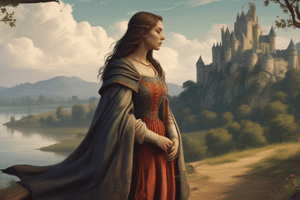Podcast
Questions and Answers
Medieval (500-1500): What is a defining feature of Medieval poetry?
Medieval (500-1500): What is a defining feature of Medieval poetry?
- Emphasis on personal emotions and subjective experience
- Use of pastoral themes and nature as central elements
- Romantic elements and the celebration of individual heroes
- Courtly love and quests depicted in poetic forms (correct)
Elizabethan (1558-1603): What characterises Elizabethan poetry?
Elizabethan (1558-1603): What characterises Elizabethan poetry?
- Clear, unambiguous language preferred over metaphorical complexity
- Incorporation of new ideas and use of 'Elizabethan English' (correct)
- Pastoral themes and detailed depiction of nature
- Satirical tone and frequent use of epic forms
Restoration (1660-1710): What was a significant change in literary taste during the Restoration period?
Restoration (1660-1710): What was a significant change in literary taste during the Restoration period?
- Shift towards clarity and away from the ambiguous language of the Metaphysical poets (correct)
- A renewed interest in complex allegorical narratives
- Focus on the sublime and nature
- Emphasis on the heroics of common people
Augustan Poetry (1700-1800): What is a key feature of Augustan poetry?
Augustan Poetry (1700-1800): What is a key feature of Augustan poetry?
Metaphysical (17th century): What typifies Metaphysical poetry?
Metaphysical (17th century): What typifies Metaphysical poetry?
Romantic (1770-1890): What distinguishes Romantic poetry?
Romantic (1770-1890): What distinguishes Romantic poetry?
Victorian (1837-1901): What is a prominent feature of Victorian poetry?
Victorian (1837-1901): What is a prominent feature of Victorian poetry?
Modernism (20th Century): What defines Modernist poetry?
Modernism (20th Century): What defines Modernist poetry?
Postmodernism (21st Century Onwards): What characterises postmodernist poetry?
Postmodernism (21st Century Onwards): What characterises postmodernist poetry?
Flashcards are hidden until you start studying
Study Notes
Medieval Poetry (500-1500)
- Defining feature: Emphasis on oral tradition, allegory, and symbolism
Elizabethan Poetry (1558-1603)
- Characterized by: Use of blank verse, exploration of themes such as love, nature, and mortality
Restoration Poetry (1660-1710)
- Significant change: Shift from Puritan ethic to more libertine and secular values
Augustan Poetry (1700-1800)
- Key feature: Emphasis on reason, satire, and didacticism, with influences from classical antiquity
Metaphysical Poetry (17th century)
- Typified by: Use of complex metaphors, intellectualism, and exploration of spiritual themes
Romantic Poetry (1770-1890)
- Distinguished by: Emphasis on emotion, imagination, and the individual, with a focus on nature and the sublime
Victorian Poetry (1837-1901)
- Prominent feature: Exploration of social issues, morality, and the role of the poet as social critic
Modernist Poetry (20th Century)
- Defined by: Experimentation with form, language, and fragmented narrative, with a focus on the inner life and psyche
Postmodernist Poetry (21st Century Onwards)
- Characterized by: Playfulness with language, rejection of grand narratives, and exploration of identity and culture
Studying That Suits You
Use AI to generate personalized quizzes and flashcards to suit your learning preferences.




